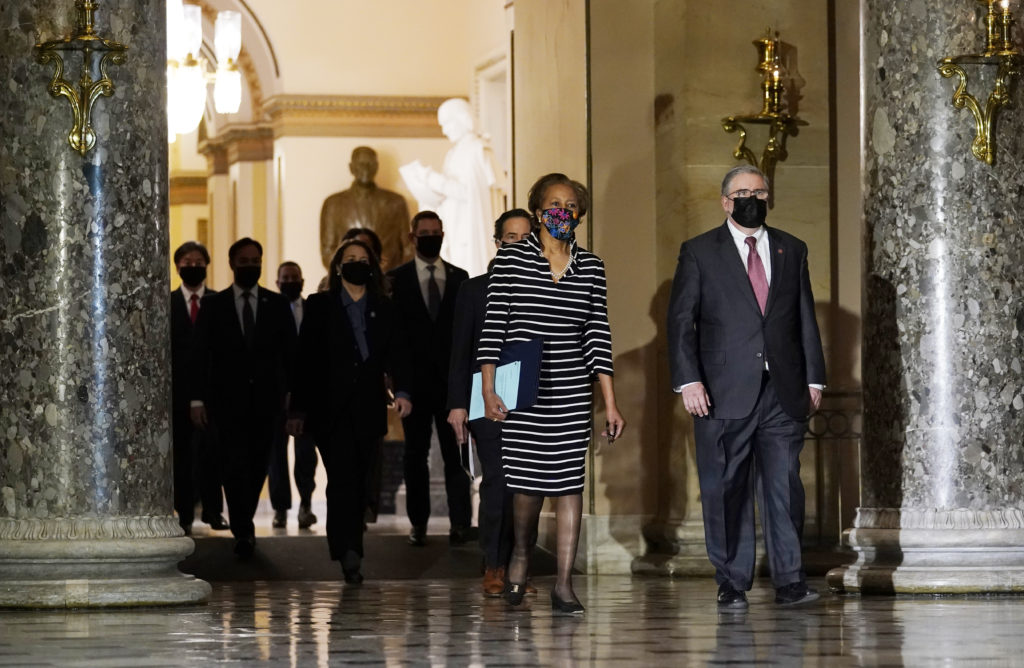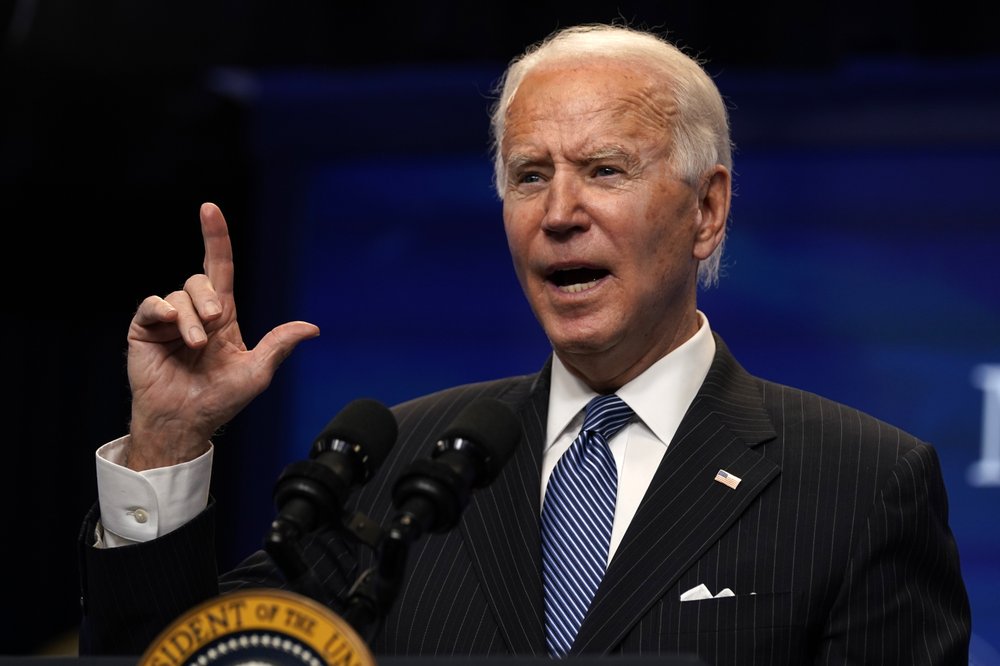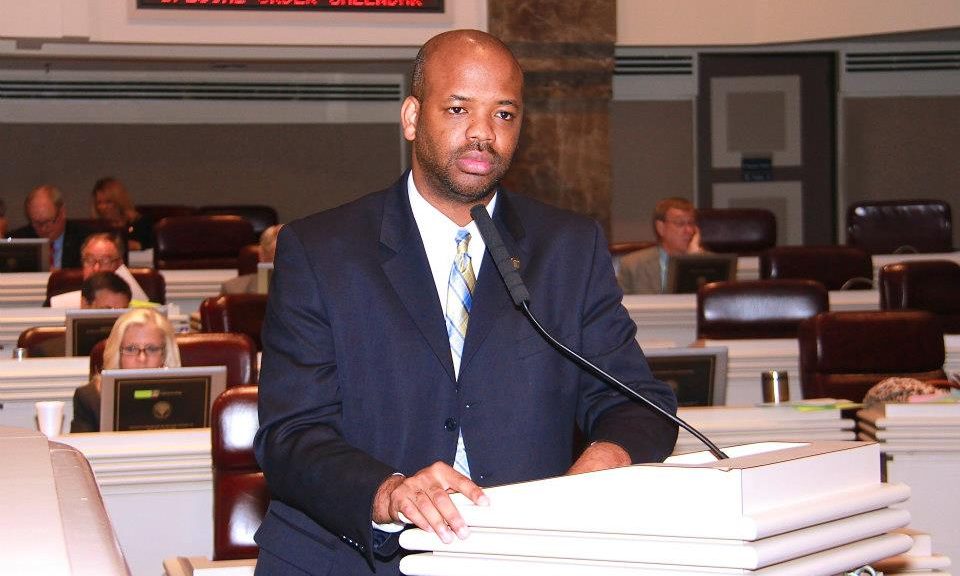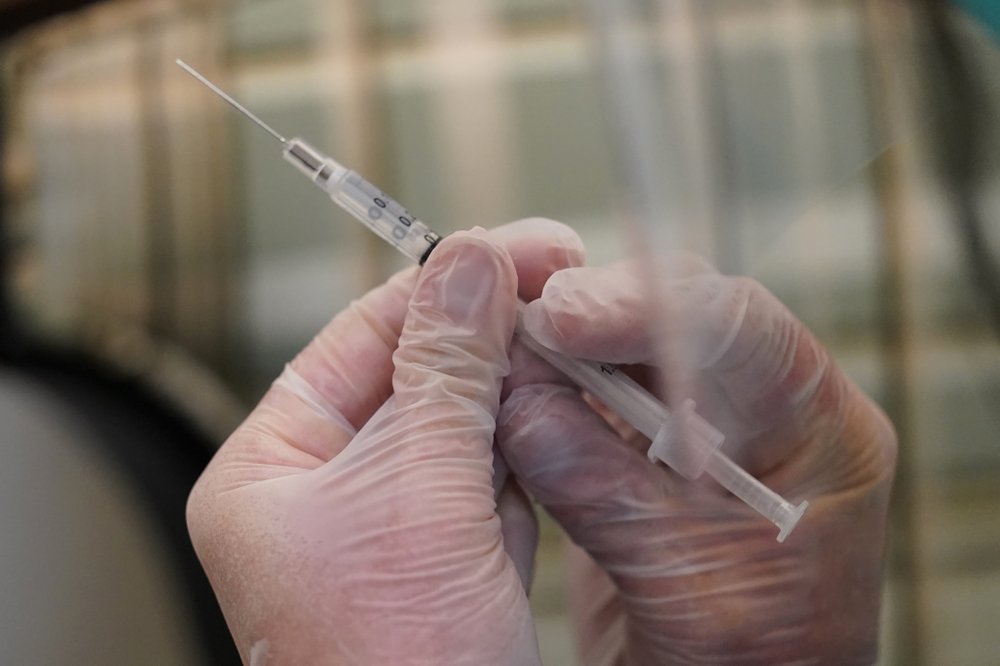Donald Trump impeachment goes to Senate, testing his sway over GOP

House Democrats delivered the impeachment case against Donald Trump to the Senate late Monday for the start of his historic trial, but Republican senators were easing off their criticism of the former president and shunning calls to convict him over the deadly siege at the U.S. Capitol. It’s an early sign of Trump’s enduring sway over the party. The nine House prosecutors carried the sole impeachment charge of “incitement of insurrection” across the Capitol, making a solemn and ceremonial march to the Senate along the same halls the rioters ransacked just weeks ago. But Republican denunciations of Trump have cooled since the Jan. 6 riot. Instead, Republicans are presenting a tangle of legal arguments against the legitimacy of the trial and questioning whether Trump’s repeated demands to overturn Joe Biden’s election really amounted to incitement. What seemed for some Democrats like an open-and-shut case that played out for the world on live television, as Trump encouraged a rally mob to “fight like hell” for his presidency, is running into a Republican Party that feels very differently. Not only are there legal concerns, but senators are wary of crossing the former president and his legions of followers — who are their voters. Security remains tight at the Capitol. Sen. John Cornyn, R-Texas, asked if Congress starts holding impeachment trials of former officials, what’s next: “Could we go back and try President Obama?” Besides, he suggested, Trump has already been held to account. “One way in our system you get punished is losing an election.” Arguments in the Senate trial will begin the week of Feb. 8, and the case against Trump, the first former president to face impeachment trial, will test a political party still sorting itself out for the post-Trump era. Republican senators are balancing the demands of deep-pocketed donors who are distancing themselves from Trump and voters who demand loyalty to him. One Republican, Sen. Rob Portman of Ohio, announced Monday he would not seek reelection in 2022, citing the polarized political atmosphere. For Democrats the tone, tenor, and length of the upcoming trial, so early in Biden’s presidency, poses its own challenge, forcing them to strike a balance between their vow to hold Trump accountable and their eagerness to deliver on the new administration’s priorities following their sweep of control of the House, Senate, and White House. Biden himself told CNN late Monday that the impeachment trial “has to happen.” While acknowledging the effect it could have on his agenda, he said there would be “a worse effect if it didn’t happen.” Biden said he didn’t think enough Republican senators would vote for impeachment to convict, though he also said the outcome might well have been different if Trump had six months left in his term. In a Monday evening scene reminiscent of just a year ago — Trump is now the first president twice impeached — the lead prosecutor from the House, this time Rep. Jamie Raskin of Maryland, stood before the Senate to read the House resolution charging “high crimes and misdemeanors.” Earlier, Senate Majority Leader Chuck Schumer said failing to conduct the trial would amount to a “get-out-jail-free card” for others accused of wrongdoing on their way out the door. Republicans appear more eager to argue over trial process than the substance of the case, he said, perhaps to avoid casting judgment on Trump’s “role in fomenting the despicable attack” on the Capitol. Schumer said there’s only one question “senators of both parties will have to answer before God and their own conscience: Is former President Trump guilty of inciting an insurrection against the United States?” On Monday, it was learned that Chief Justice John Roberts is not expected to preside at the trial, as he did during Trump’s first impeachment, potentially affecting the gravitas of the proceedings. The shift is said to be in keeping with protocol because Trump is no longer in office. Instead, Sen. Patrick Leahy, D- Vt., who serves in the largely ceremonial role of Senate president pro tempore, is set to preside. Leaders in both parties agreed to a short delay in the proceedings that serves their political and practical interests, even as National Guard troops remain at the Capitol amid security threats on lawmakers ahead of the trial. The start date gives Trump’s new legal team time to prepare its case, while also providing more than a month’s distance from the passions of the bloody riot. For the Democratic-led Senate, the intervening weeks provide prime time to confirm some of Biden’s key Cabinet nominees. Sen. Chris Coons, D-Del., questioned how his colleagues who were in the Capitol that day could see the insurrection as anything other than a “stunning violation” of the nation’s history of peaceful transfers of power. “It is a critical moment in American history,” Coons said Sunday in an interview. An early vote to dismiss the trial probably would not succeed, given that Democrats now control the Senate. The House approved the charge against Trump on Jan. 13, with 10 Republicans joining the Democrats. Still, the mounting Republican opposition to the proceedings indicates that many GOP senators will eventually vote to acquit Trump. Democrats would need the support of 17 Republicans — a high bar — to convict him. One by one, Republican senators are explaining their objections to the unprecedented trial and scoffing at the idea of trying to convict Trump now that he’s no longer in office. Rand Paul of Kentucky said that without the chief justice presiding the proceedings are a “sham.” Joni Ernst of Iowa said that while Trump “exhibited poor leadership,” it’s those who assaulted the Capitol who “bear the responsibility.” New Sen. Tommy Tuberville of Alabama said Trump is one of the reasons he is in the Senate, so “I’m proud to do everything I can for him.” Sen. Tom Cotton, R-Ark., is among those who say the Senate does not have the constitutional authority to convict a former president. Democrats reject that argument, pointing to an 1876 impeachment of
Joe Biden more bullish on vaccines, open to 1.5M daily shot goal

President Joe Biden on Monday appeared to boost his goal for coronavirus vaccinations in his first 100 days in office, suggesting the nation could soon be injecting 1.5 million shots on an average per day. Biden signaled his increasing bullishness on the pace of vaccinations after signing an executive order to boost government purchases from U.S. manufacturers. It was among a flurry of moves by Biden during his first full week to show he’s taking swift action to heal an ailing economy as talks with Congress over a $1.9 trillion stimulus package showed few signs of progress. Biden reiterated that he believes the country is in a precarious spot and that relief is urgently needed, even as he dismissed the possibility of embracing a scaled-down bill to secure passage faster. Among the features of the stimulus plan are a national vaccination program, aid to reopen schools, direct payments of $1,400 to individuals, and financial relief for state and local governments. “Time is of the essence,” Biden said. “I am reluctant to cherry-pick and take out one or two items here.” Biden’s new vaccination target comes after he and his aides faced criticism for the 100 million goal in his first 100 days in office. The U.S. has exceeded a pace of 1 million doses per day over the last week. “I think we may be able to get that to … 1.5 million a day, rather than 1 million a day,” Biden said, “but we have to meet that goal of a million a day.” Biden added that he expects widespread availability of the vaccines for Americans by spring, with the U.S. “well on our way to herd immunity” necessary to end the pandemic by summer. Even so, he warned the nation was going to be “in this for a while and could see between “600,000 and 660,000 deaths before we begin to turn the corner in a major way.” As of Sunday, the federal government had distributed 41.4 million vaccine doses to states and other jurisdictions. Of that, 21.8 million doses had been administered, or about 53%. About 3.2 million people had received their full two-dose vaccination, a little less than 1% of the population. That’s according to statistics from the Centers for Disease Control and Prevention. Already, more than 420,000 Americans have died from the coronavirus. Biden’s team held a call Sunday to outline the stimulus plan with at least a dozen senators, while the president also privately talked with lawmakers. “There’s an urgency to moving it forward, and he certainly believes there has to be progress in the next couple of weeks,” White House press secretary Jen Psaki said Monday. She warned that action needed to be taken before the U.S. reaches an “unemployment cliff” in March, when long-term unemployment benefits expire for millions of Americans. But Republicans on Capitol Hill were not joining in the push for immediate action. One key Republican, Sen. Susan Collins of Maine, said after Sunday’s call that “it seems premature to be considering a package of this size and scope.” Collins described the additional funding for vaccinations as useful while cautioning that any economic aid should be more targeted. Senate Minority Leader Mitch McConnell, R-Ky., said Monday that “any further action should be smart and targeted, not just an imprecise deluge of borrowed money that would direct huge sums toward those who don’t need it.” Biden sought to downplay the rhetoric from GOP lawmakers, saying, “I have been doing legislative negotiations for a large part of my life. I know how the system works.” “This is just the process beginning,” he added. “No one wants to give up on their position until there’s no other alternative.” Monday’s order will likely take 45 days or longer to make its way through the federal bureaucracy, during which time wrangling with Congress could produce a new aid package. That would be a follow-up to the roughly $4 trillion previously approved to tackle the economic and medical fallout from the coronavirus. The order was aimed at increasing factory jobs, which have slumped by 540,000 since the pandemic began last year. “America can’t sit on the sidelines in the race for the future,” Biden said before signing the order in the Eisenhower Executive Office Building. “We’re ready, despite all we’re facing.” Biden’s order would modify the rules for the Buy American program, making it harder for contractors to qualify for a waiver and sell foreign-made goods to federal agencies. It also changes rules so that more of a manufactured good’s components must originate from U.S. factories. America-made goods would also be protected by an increase in the government’s threshold and price preferences, the difference in price over which the government can buy a foreign product. It’s an order that channels Biden’s own blue-collar persona and his promise to use the government’s market power to support its industrial base, an initiative that former President Donald Trump also attempted with executive actions and import taxes. “Thanks to past presidents granting a trade-pact waiver to Buy American, today billions in U.S. tax dollars leak offshore every year because the goods and companies from 60 other countries are treated like they are American for government procurement purposes,” said Lori Wallach, director of Public Citizen’s Global Trade Watch and a critic of past trade agreements. While Trump also issued a series of executive actions and tariffs with the goal of boosting manufacturing, he didn’t attempt to rewrite the guidance for what constitutes a U.S.-made component or tighten the process for granting exemptions to buy foreign goods, a key difference from Biden’s agenda, Biden’s administration said. The order also has elements that apply to the separate Buy America program that applies to highways and bridges. It aims to open up government procurement contracts to new companies by scouting potential contractors. The order would create a public website for companies that received waivers to sell foreign goods to the government, so that U.S. manufacturers can have more information and be in a
Lawsuit filed in Democratic Party leadership battle

A new federal lawsuit is challenging bylaws changes at the Alabama Democratic Party that led to the installment of new leadership. Joe Reed, chairman of the Alabama Democratic Conference — the state’s oldest Black political organization — announced the lawsuit last week. The lawsuit contends that the changes violated a decades-old consent decree meant to ensure Blacks are represented on the party’s executive committee in numbers that reflect their percentages in the Democratic electorate. The lawsuit contends that the new bylaws which sought to nominate Hispanics, Asians, Native Americans, LGBTQ individuals, and young people diluted the influence of Black committee members. “When whites deserted the Alabama Democratic Party, Blacks embraced it and held it together,” Reed wrote in a letter announcing the lawsuit. Reed said the changes sought to “weaken Blacks’ influence and give control of the party to whites.” The lawsuit filed in federal court is the latest volley in the dispute between battling factions within the state Democratic Party. The bylaws approved in 2019 led to the election of current Chairman Chris England and the removal of Nancy Worley, who was supported by Reed. England is the first Black chairman of the party, Barry Ragsdale, a lawyer who represented Democrats who supported the new bylaws and changes in the party’s leadership, said the lawsuit is, “nothing more than sour grapes by Joe Reed and his shrinking band of loyalists.” “These are the same false and unfounded claims that these same folks raised in 2019 and that were thrown out by the Circuit Court and by the Alabama Supreme Court,” Ragsdale said. Ragsdale noted the changes led to the election of the party’s first Black chairman. Republished with the permission of the Associated Press.
AEA: ‘Education employees are dying,’ seeks vaccinations

The Alabama Education Association is urging the state to give teachers COVID-19 vaccinations following the deaths of at least 39 public school employees from the contagious illness. The group, which represents public education employees, sent a letter Friday to State Health Officer Scott Harris asking the state to direct county health departments to begin vaccinating education employees “as soon as possible.” AEA said Monday that at least 39 school workers have died from COVID-19. The number includes teachers, support staff, coaches, and administrators. “Education employees are dying on an almost daily basis because of COVID-19 and complications therefrom. Other than the closure of schools, the only way to prevent this or slow this is to provide for the widespread vaccination of employees,” Theron Stokes, AEA associate executive director, wrote. Alabama is currently giving vaccinations only to health care workers, nursing home residents, people 75 and older and first responders. Under the state vaccine plan, the first shots in the rollout were given to health care workers and nursing home residents. The state announced earlier this month that it is triaging people in the 1b group because of the limited supply. The state on Jan. 18 began vaccinating people over 75 and first responders, but others in the 1b group — such as teachers — would have to wait. AEA said that four educators in the Montgomery County Schools system died within 48 hours and a total of seven have died. Following the string of deaths, Montgomery Schools Superintendent Ann Roy Moore announced Monday that the county school system is switching to all virtual learning beginning Feb. 1 and will remain virtual until vaccinations are available to educators. Moore said she could confirm at least four school system employees had died after contracting COVID-19. Harris, who heads the Alabama Department of Public Health, said Friday that the supply of vaccine is the chief barrier to getting more groups vaccinated. As of Monday, the state of nearly 5 million people has had 521,225 doses delivered to the state and 255,291 shots have been administered. Currently, there are more than 600,000 people eligible for vaccinations in Alabama, including 325,000 health care workers and 350,000 people who are 75 or older. President Joe Biden’s administration has moved to expand national eligibility to people over 65 as part of a proposed vaccination blitz to get more shots in arms. “We believe every one of those people deserves a vaccine and needs to get it as fast as possible. Yet at the same time adding hundreds of thousands of people to the lines we have right now, without any more vaccine, is going to be a difficult situation for everyone,” Harris said. The state is receiving between 50,000 and 60,000 doses per week. The vaccine rollout has been punctuated with frustration as people jammed a state appointment line trying to get an appointment for a shot. In announcing Montgomery County’s switch to a virtual schedule, Moore said they are being told the vaccine should be available to teachers there between February and early March, but added that is not definite. “While time out of the classroom is difficult, learning losses can be made up. Lives cannot be brought back when they are lost,” AEA President Sherry Tucker said. Harris has said it will likely be spring or summer before the vaccinations are available to everyone regardless of age or occupation. Republished with the permission of the Associated Press.


